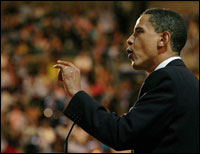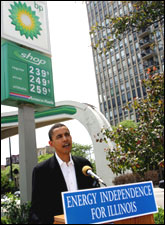
Barack Obama.
Photo: David Katz/Obama for Illinois.
As if America needs one more reason to fall in love with Barack Obama.
Beyond the unabashed idealism, stirring oratory skills, touching life story, and knee-buckling smile that have made this candidate for Illinois’ open Senate seat the new beau ideal of progressive politics, it so happens that this guy is a bona fide, card-carrying, bleeding-heart greenie.
And it’s not as though Muckraker didn’t rifle through his environmental record going back more than a decade to try to find something off-kilter — some skeleton in the closet, some flaw to make him a mere mortal. But all we found were accolades and evidence of true conviction.
Obama’s comments at the League of Conservation Voters‘ pro-Kerry rally last week — made only hours before he delivered the convention speech that catapulted him onto the national stage and elicited comparisons to Martin Luther King Jr. and John F. Kennedy — brought enviros to their knees.
“Environmentalism is not an upper-income issue, it’s not a white issue, it’s not a black issue, it’s not a South or a North or an East or a West issue. It’s an issue that all of us have a stake in,” Obama shouted. “And if I can do anything to make sure that not just my daughter but every child in America has green pastures to run in and clean air to breathe and clean water to swim in, then that is something I’m going to work my hardest to make happen.”

Stirring up the convention crowd.
Photo: David Katz/Obama for Illinois.
The crowd went bananas in response to this call for unity across ethnic and socio-economic lines, as though they’d been waiting for exactly this kind of dynamic leader to free environmentalism from the perception that it’s predominately a white upper-middle-class issue.
Obama’s environmental activism stretches back to his undergrad days at Columbia University, during which he did a three-month stint with a Ralph Nader offshoot organization trying to convince minority students at City College in Harlem to recycle. Later, when he worked as a community organizer on the South Side of Chicago, he fought for lead abatement in the Altgeld Gardens neighborhood.
After getting a law degree from Harvard, Obama became a civil-rights lawyer and then in 1996 was elected to the Illinois state senate, representing the 13th district on Chicago’s South Side, where he distinguished himself as a leader on environmental and public-health issues. In 2003, Obama was one of six state senators to receive a 100 Percent Environmental Voting Record Award from the Illinois Environmental Council.
His efforts on behalf of the environment have been so consistent and comprehensive, in fact, that LCV and the Sierra Club endorsed Obama in his bid for Congress this year over half a dozen other Democrats competing in the primary. Last month, the LCV named him a 2004 Environmental Champion, one of 18 sitting and prospective members of Congress to receive the award.
Obama is “by far one of the most compelling and knowledgeable politicians on the environment I’ve ever sat in a room with,” Mark Longabaugh, senior vice president for political affairs at LCV, told Muckraker. “I’ve been playing national politics for more than 20 years and I quite literally can’t remember one person I’ve met — even on a national level — who was more in command of facts, more eloquent, and more passionate on these issues than Sen. Obama.”
Obama’s commitment to environmental protection has a personal component: His six-year-old daughter, Malia, has chronic asthma, a fact he often cites when defending the long list of initiatives he has pushed to clean up smog and air pollution in his state. And many of his constituents suffer from the same condition. “More people die from asthma attacks in Chicago than anywhere else in the country,” said Brian Urbaszewski, director of environmental health programs for the American Lung Association of Metropolitan Chicago. “And Illinois has the highest African-American death rate from asthma in the country — four times the national average.”
This year, Obama made an aggressive move to stem the tide of pollution from Illinois’ coal plants — which produce nearly 50 percent of the state’s electricity — by introducing a bill that would in effect block the Bush administration’s rollback of the Clean Air Act’s new-source review rules from being carried out in his state. “This is a very complex issue, but Obama took it by storm,” Urbaszewski told Muckraker. “He dove headfirst into all the complexities and wouldn’t quit until he had a solution.”
According to Jack Darin, who, as director of the Sierra Club’s Illinois chapter, has worked with Obama closely on these issues, “He’s an incredibly quick study. He’s not a scientist, but remarkably adept at analyzing the details of complex environmental issues, asking the right questions, and ultimately making the right policy decision for public interest.”
To build support for cleaner air, Obama opened a dialogue with the coal-mining industry about how better pollution controls on power plants could help create new markets for Illinois coal. Most of the coal now being burned in Illinois comes from Wyoming and other Western states, which has hurt the Illinois coal industry. But Illinois coal is cleaner in terms of pollutants such as mercury. Obama argued that cracking down on mercury pollution from coal-fired plants would give Illinois coal a competitive advantage over Western coal.
“Most politicians have forever played the interests of the coal industry and the environment against each other,” said Darin, “but Obama found a way to argue soundly that we can put mine workers back to work while making the air cleaner.”

Stumping for a saner energy plan.
Photo: David Katz/Obama for Illinois.
Obama has taken on energy matters in Illinois as aggressively as air-quality protection. As state senator, he is cosponsoring a pending measure that would require 10 percent of the electricity generated in the state to come from renewable sources by 2012, and he supports another pending bill that would tighten energy-efficiency codes in residential and commercial buildings.
And Obama is making energy independence one of the top three priorities in his campaign for a seat in the U.S. Senate, according to his spokesperson, Robert Gibbs. He has pledged to endorse legislation that would require 20 percent of America’s power supply to be generated by renewable sources by 2020, as well as regulations that would boost Corporate Average Fuel Economy standards to 40 miles per gallon for cars.
The list doesn’t stop there. Obama has fought for tougher standards on diesel engines, waged battles against urban sprawl and the destruction of Illinois’ wetlands, and mobilized residents in Chicago’s lowest-income neighborhoods to block toxic dumping in their communities.
It’s particularly notable that Obama has gone out on a political limb to advance environmental protections. “Illinois is a heavily industrial state, and a tough place for environmentalists and other progressives,” said Darin. “Illinois is a state that has no limits on campaign financing, meaning the special interests are well entrenched.” But Obama has never capitulated, said Darin, and for most of his time in the state senate, he has been in the minority, arguing against the political grain with surprising success.
Nothing could better prepare him for the current scene in Washington, D.C.

